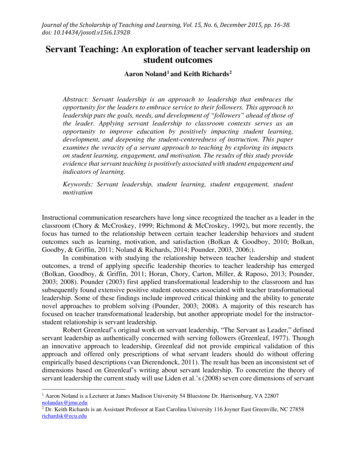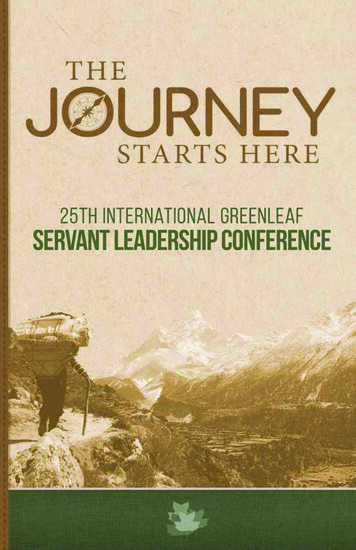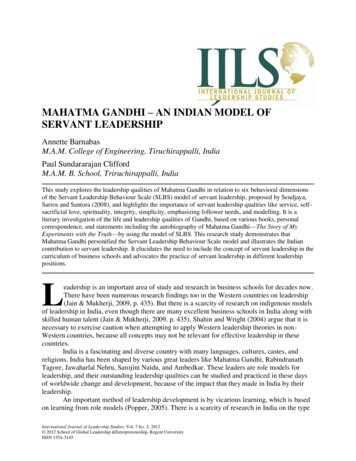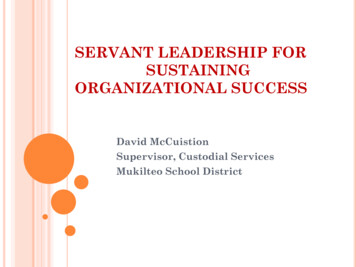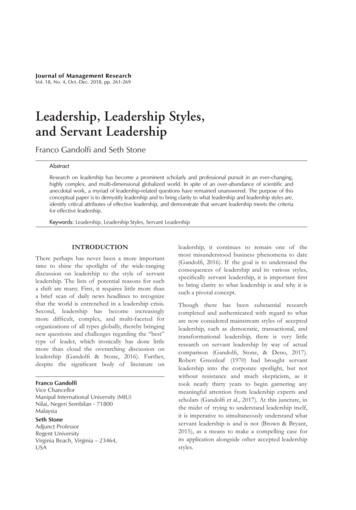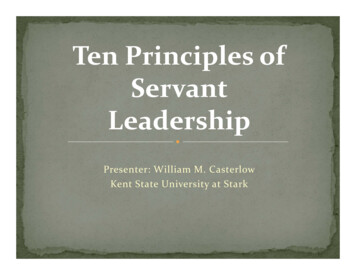
Transcription
Ten Principles ofServantLeadershipPresenter: William M. CasterlowKent State University at Stark
The ideas behind servant leadership are ancient, but Robert K. Greenleaf is the personwho first articulated them for our time. Greenleaf was born in 1904 in Terre Haute,Indiana at the height of that city’s robust participation in the Industrial Revolution. Hisfather, George, was a wizard mechanic and machinist who also acted as a communitysteward. In his last published writing, Greenleaf said his father was his original model fora servant‐leader.
Servant leadership is a philosophy andset of practices that enriches the lives ofindividuals, builds better organizationsand ultimately creates a more just andcaring world.
Listening Conceptualization Empathy Foresight Healing Awareness Persuasion Stewardship Commitment toGrowth BuildingCommunity
Traditionally, leaders have been valued for theircommunication and decision making skills. Servant‐leaders must reinforce these important skills bymaking a deep commitment to listening intently toothers. Servant‐leaders seek to identify and clarify thewill of a group. They seek to listen receptively to whatis being said (and not said). Listening alsoencompasses getting in touch with one's inner voice,and seeking to understand what one's body, spirit, andmind are communicating.
Servant‐leaders strive to understand and empathizewith others. People need to be accepted andrecognized for their special and unique spirit. Onemust assume the good intentions of coworkers and notreject them as people, even when forced to reject theirbehavior or performance.
Learning to heal is a powerful force fortransformation and integration. One of the greatstrengths of servant‐leadership is the potential forhealing one's self and others.In "The Servant as Leader", Greenleaf writes,"There is something subtle communicated to onewho is being served and led if, implicit in thecompact between the servant‐leader and led is theunderstanding that the search for wholeness issomething that they have."
General awareness, and especially self‐awareness,strengthens the servant‐leader. Making a commitmentto foster awareness can be scary‐‐one never knowswhat one may discover! As Greenleaf observed,"Awareness is not a giver of solace ‐ it's just theopposite. It disturbed. They are not seekers of solace.They have their own inner security."
Servant‐leaders rely on persuasion, rather thanpositional authority in making decisions. Servant‐leaders seek to convince others, rather than coercecompliance. This particular element offers one of theclearest distinctions between the traditionalauthoritarian model and that of servant‐leadership.The servant‐leader is effective at building consensuswithin groups.
Servant‐leaders seek to nurture their abilities to"dream great dreams." The ability to look at a problem(or an organization) from a conceptualizingperspective means that one must think beyond day‐to‐day realities. Servant‐leaders must seek a delicatebalance between conceptualization and day‐to‐dayfocus.
Foresight is a characteristic that enables servant‐leaders to understand lessons from the past, therealities of the present, and the likely consequence of adecision in the future. It is deeply rooted in theintuitive mind.
Robert Greenleaf's view of all institutions was one inwhich CEO's, staff, directors, and trustees all playsignificant roles in holding their institutions in trustfor the greater good of society.
Servant‐leaders believe that people have an intrinsicvalue beyond their tangible contributions as workers.As such, servant‐leaders are deeply committed to apersonal, professional, and spiritual growth of eachand every individual within the organization.
Servant‐leaders are aware that the shift from localcommunities to large institutions as the primaryshaper of human lives has changed our perceptionsand has caused a feeling of loss. Servant‐leaders seekto identify a means for building community amongthose who work within a given institution.
Center for Servant t‐leadership/
The ideas behind servant leadership are ancient, but Robert K. Greenleaf is the person who first articulated them for our time. Greenleaf was born in 1904 in Terre Haute, Indiana at the height of that city's robust participation in the Industrial Revolution. His


